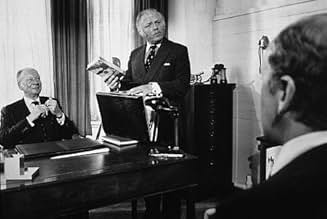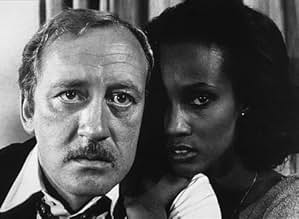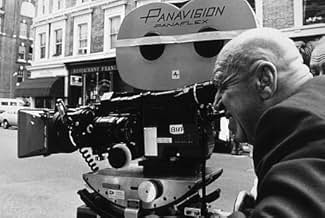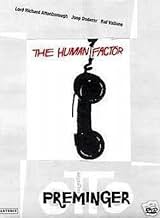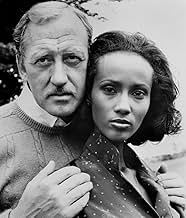IMDb-BEWERTUNG
6,1/10
1718
IHRE BEWERTUNG
Füge eine Handlung in deiner Sprache hinzuWhen a leak of information in the African section of British Intelligence is discovered, security man Daintry is brought in to investigate.When a leak of information in the African section of British Intelligence is discovered, security man Daintry is brought in to investigate.When a leak of information in the African section of British Intelligence is discovered, security man Daintry is brought in to investigate.
- Regie
- Drehbuch
- Hauptbesetzung
Empfohlene Bewertungen
Tom Stoppard's adaptation, and Preminger's direction, seem to have produced a stylish and grown-up filmed interpretation of Greene's sardonic yet moving condemnation of the cruelty of the Cold-War, during which both the Left and the Right have forgotten 'The Human Factor.'
Both the West and the Soviets are portrayed as they execute a risibly elephantine yet humanly appalling dance of death over the crushed lives of ordinary, decent people.
This remarkably accomplished and understated politico/moral thriller is a far more effective translation of an immeasurably greater book than is the more recent film of John Le Carre's original novel of 'The Tailor of Panama.' The latter film in particular entirely fudges the politics of Noriega's Panama, and the United States' role therein. Preminger's film, by contrast, is amazingly honest and balanced, for its period, about the protagonists of the fraught global struggle of its time. In this it is faithful to Greene's intentions.
No doubt the earlier film was critically sunk by its evident contempt for the received political 'wisdom' of its age. And by its willingness to entertain the possibility that the 'democratic' West could quite easily countenance Nazi-style medical research, both for the removal of inconvenient individuals like the wretched Davis, and for sale to strategic allies like apartheid-era South Africa in the form of a poison gas 'cordon sanitaire' between them and black Africa. Certainly, even the best American reviews (which always heavily preponderate on this Website), while they 'condemn with faint praise,' studiedly avoid any mention of the political and moral core of the film. This is to circumvent, and to radically subvert, the integrity of a serious work.
However, anyone who has actually grown up since then should enjoy and appreciate this rather brilliant - if neglected - film version of a Grahame Greene classic: Script, performances, design and filming are uniformly excellent. It is far, far more than a spy-thriller. Greene's original is faithfully followed into areas that Le Carre merely touches upon.
Special praise and thanks, therefore, to BBC4's original and brave choice to programme it on their new British channel, recently! Naturally, it is not commercially available in Britain. American capitalism, however - to its partial credit! - is capable of allowing this film to exist at least as a product, relying on dialectical hostility to effectively police the public's exposure to such an evidently heretical viewpoint! Sufficient numbers of people will always helpfully parrot the 'official line' that is peddled by our cultural 'commissars' in order to prevent such views spreading in the wildfire manner which a truly free exchange of ideas would permit. Their critical contempt for the viewing public is obviously justified, I regret to say.
Both the West and the Soviets are portrayed as they execute a risibly elephantine yet humanly appalling dance of death over the crushed lives of ordinary, decent people.
This remarkably accomplished and understated politico/moral thriller is a far more effective translation of an immeasurably greater book than is the more recent film of John Le Carre's original novel of 'The Tailor of Panama.' The latter film in particular entirely fudges the politics of Noriega's Panama, and the United States' role therein. Preminger's film, by contrast, is amazingly honest and balanced, for its period, about the protagonists of the fraught global struggle of its time. In this it is faithful to Greene's intentions.
No doubt the earlier film was critically sunk by its evident contempt for the received political 'wisdom' of its age. And by its willingness to entertain the possibility that the 'democratic' West could quite easily countenance Nazi-style medical research, both for the removal of inconvenient individuals like the wretched Davis, and for sale to strategic allies like apartheid-era South Africa in the form of a poison gas 'cordon sanitaire' between them and black Africa. Certainly, even the best American reviews (which always heavily preponderate on this Website), while they 'condemn with faint praise,' studiedly avoid any mention of the political and moral core of the film. This is to circumvent, and to radically subvert, the integrity of a serious work.
However, anyone who has actually grown up since then should enjoy and appreciate this rather brilliant - if neglected - film version of a Grahame Greene classic: Script, performances, design and filming are uniformly excellent. It is far, far more than a spy-thriller. Greene's original is faithfully followed into areas that Le Carre merely touches upon.
Special praise and thanks, therefore, to BBC4's original and brave choice to programme it on their new British channel, recently! Naturally, it is not commercially available in Britain. American capitalism, however - to its partial credit! - is capable of allowing this film to exist at least as a product, relying on dialectical hostility to effectively police the public's exposure to such an evidently heretical viewpoint! Sufficient numbers of people will always helpfully parrot the 'official line' that is peddled by our cultural 'commissars' in order to prevent such views spreading in the wildfire manner which a truly free exchange of ideas would permit. Their critical contempt for the viewing public is obviously justified, I regret to say.
'Sr Moreno' dismisses the Preminger film adaptation of 'The human factor' very intemperately: The clincher of his argument - which consists largely in being rude to Iman (she was perfectly adequate in her role, and certainly believably a beauty whom a career diplomat might have risked his career for) - is Graham Greene's own declared dislike of Preminger's version.
While obviously his own direct collaboration with Carol Reed made 'The Third Man' into the definitive Greene adaptation for the screen, and a classic sans pareil, there is still no need to be unduly respectful of his impatience with this version of his 'The human factor.'
After all, Greene had a well-known falling-out with Mankiewicz during the filming of the 1959 version of 'The quiet American,' but no-one else thinks that was a bad movie!
Few filmed adaptations are entirely successful - probably without the original author's close collaboration they will inevitably be more-or-less diminished versions of the literary form. And while Grahame Greene was perfectly entitled, with the status of 'onelie true begetter' to be hyper-critical of any lesser recensions, that is not a sensible reason for the rest of us not to enjoy and appreciate what is a perfectly intelligent and involving film in its own right.
There are few enough thrillers around on the TV today which do not involve various forms of adolescent excitability and excess that I should have thought the BBC were perfectly justified in giving it an airing recently on their 'thoughtful' channel.
This is no 'The third man' to be sure - but then, what is? This remains a film with, clearly, much in it to admire.
Surely, if every film has to achieve the status of 'masterpiece' before it can be accepted at all - as 'Moreno' appears to believe - then would there not be a certain danger of an unbridgeable culture-gap developing between the extremes of 'art-house film' and 'teen-flick'? Fortunately, audiences - and film-makers - are still quite willing to 'give it a go,' even if the results are 'merely' intelligent, rather than the absolutely brilliant - and still quite rare - product of genius!
Really, I feel most strongly that 'Moreno''s strictures represent exactly the kind of intellectual snobbery which can only tend to alienate cinema audiences even further from any more sober and challenging films.
There really are enough points of worthwhile discussion raised by this film of 'The human factor' for it to be impossible to dismiss in a single paragraph of supercilious contempt: 'Terrible' does not amount to a review, but only to intemperate spleen, I'm afraid.
While obviously his own direct collaboration with Carol Reed made 'The Third Man' into the definitive Greene adaptation for the screen, and a classic sans pareil, there is still no need to be unduly respectful of his impatience with this version of his 'The human factor.'
After all, Greene had a well-known falling-out with Mankiewicz during the filming of the 1959 version of 'The quiet American,' but no-one else thinks that was a bad movie!
Few filmed adaptations are entirely successful - probably without the original author's close collaboration they will inevitably be more-or-less diminished versions of the literary form. And while Grahame Greene was perfectly entitled, with the status of 'onelie true begetter' to be hyper-critical of any lesser recensions, that is not a sensible reason for the rest of us not to enjoy and appreciate what is a perfectly intelligent and involving film in its own right.
There are few enough thrillers around on the TV today which do not involve various forms of adolescent excitability and excess that I should have thought the BBC were perfectly justified in giving it an airing recently on their 'thoughtful' channel.
This is no 'The third man' to be sure - but then, what is? This remains a film with, clearly, much in it to admire.
Surely, if every film has to achieve the status of 'masterpiece' before it can be accepted at all - as 'Moreno' appears to believe - then would there not be a certain danger of an unbridgeable culture-gap developing between the extremes of 'art-house film' and 'teen-flick'? Fortunately, audiences - and film-makers - are still quite willing to 'give it a go,' even if the results are 'merely' intelligent, rather than the absolutely brilliant - and still quite rare - product of genius!
Really, I feel most strongly that 'Moreno''s strictures represent exactly the kind of intellectual snobbery which can only tend to alienate cinema audiences even further from any more sober and challenging films.
There really are enough points of worthwhile discussion raised by this film of 'The human factor' for it to be impossible to dismiss in a single paragraph of supercilious contempt: 'Terrible' does not amount to a review, but only to intemperate spleen, I'm afraid.
Nicol Williamson remains restrained throughout the film, yet his face is so expressive that it does mirror the emotions and thoughts of his character. His admirable performance elevates this otherwise flat, talky thriller, which definitely tries to be a non-taditional spy drama, in the spirit of "The Ipcress File", but doesn't even have the elementary excitement we expect from the genre. (**)
After I had read this late Graham Greene novel years ago, I was immediately fascinated by its le Carré-like plot with very much Greene-like characters. I immediately thought that this should have been made into a movie.
Shortly afterwards, I learnt that Preminger had already made it into a film back in 1979, so I was of course very eager to see this movie. Yet - this film has fallen into oblivion, it is not commercially available and it is hardly ever on TV.
Very strange if you consider that it features a cast bristling with splendid British character actors (Nicol Williamson, Derek Jacobi, Robert Morley, Richard Attenborough, to name but a few) and has a screenplay by Tom Stoppard (which IMHO was a straightforward, enjoyable transfer of Greene's novel to the screen).
So, only yesterday did I have the opportunity to watch it on TV. Certainly, it is no cinematographic highlight: it is very low-key, very unfussily directed by Otto Preminger in a more than plain style, and has basically no "action" (but then - what would you expect of a Greene novel?). It might as well have been made for TV, but this impression may also be due to the serious budget problems while filming.
However, it has some splendid performances by actors whom I could watch all day long. The mere cast turns this film into a success and makes it worthwhile watching.
Shortly afterwards, I learnt that Preminger had already made it into a film back in 1979, so I was of course very eager to see this movie. Yet - this film has fallen into oblivion, it is not commercially available and it is hardly ever on TV.
Very strange if you consider that it features a cast bristling with splendid British character actors (Nicol Williamson, Derek Jacobi, Robert Morley, Richard Attenborough, to name but a few) and has a screenplay by Tom Stoppard (which IMHO was a straightforward, enjoyable transfer of Greene's novel to the screen).
So, only yesterday did I have the opportunity to watch it on TV. Certainly, it is no cinematographic highlight: it is very low-key, very unfussily directed by Otto Preminger in a more than plain style, and has basically no "action" (but then - what would you expect of a Greene novel?). It might as well have been made for TV, but this impression may also be due to the serious budget problems while filming.
However, it has some splendid performances by actors whom I could watch all day long. The mere cast turns this film into a success and makes it worthwhile watching.
A Cold War Tragedy
Great dialogue and characters. Nicol Williamson plays our hero. He does some brilliant and subtle work here. Always a pleasure to see him on the screen.
Iman plays his wife. Unfortunately, she is hopelessly outclassed by the rest of the cast which makes her okay performance look worse by comparison.
Robert Morley steals the show as the villainous doctor who gets more of a thrill from killing than healing people. He owns every scene he is in.
As for the plot and pacing, I have some criticism. Just as the main story start to pick up steam, there is an extended flashback in the middle of the film that derails the momentum. I wish they found a different way to present that information that didn't effect the pacing.
Great dialogue and characters. Nicol Williamson plays our hero. He does some brilliant and subtle work here. Always a pleasure to see him on the screen.
Iman plays his wife. Unfortunately, she is hopelessly outclassed by the rest of the cast which makes her okay performance look worse by comparison.
Robert Morley steals the show as the villainous doctor who gets more of a thrill from killing than healing people. He owns every scene he is in.
As for the plot and pacing, I have some criticism. Just as the main story start to pick up steam, there is an extended flashback in the middle of the film that derails the momentum. I wish they found a different way to present that information that didn't effect the pacing.
Wusstest du schon
- WissenswertesAuthor Graham Greene said of his novel "The Human Factor" in his 1980 autobiography "Ways of Escape" that it was "to write a novel of espionage free from the conventional violence, which has not, in spite of James Bond, been a feature of the British Secret Service. I wanted to present the Service unromantically as a way of life, men going daily to their offices to earn their pensions."
- PatzerIn the South African scenes (filmed in Kenya), the cars have Kenyan registration plates.
- Zitate
Maurice Castle: [referring to Davis] He calls all children "little bastards".
Top-Auswahl
Melde dich zum Bewerten an und greife auf die Watchlist für personalisierte Empfehlungen zu.
- How long is The Human Factor?Powered by Alexa
Details
- Erscheinungsdatum
- Herkunftsland
- Offizielle Standorte
- Sprache
- Auch bekannt als
- The Human Factor
- Drehorte
- Produktionsfirmen
- Weitere beteiligte Unternehmen bei IMDbPro anzeigen
Box Office
- Budget
- 5.500.000 $ (geschätzt)
- Bruttoertrag in den USA und Kanada
- 376.050 $
- Weltweiter Bruttoertrag
- 376.050 $
Zu dieser Seite beitragen
Bearbeitung vorschlagen oder fehlenden Inhalt hinzufügen

Oberste Lücke
By what name was Der menschliche Faktor (1979) officially released in India in English?
Antwort

